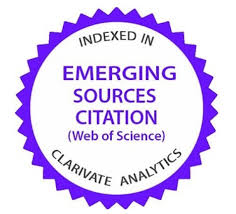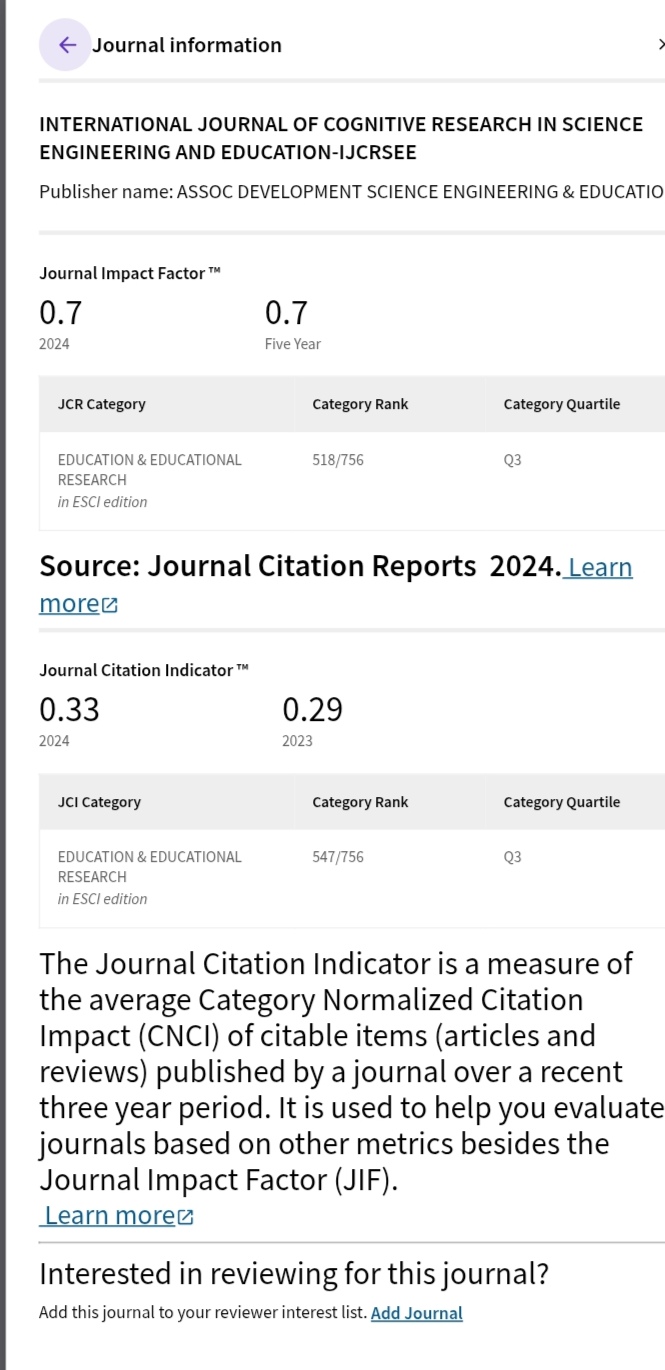Impact of a One-Off Demonstration on the Use of ICT in the Teaching of Andragogy Students on Their Change of Attitude Towards the Use of ICT in Education
DOI:
https://doi.org/10.23947/2334-8496-2021-9-1-121-134Keywords:
ICT in education, Python, AIDA method, attitudes towards the use of ICT in educationAbstract
The research study deals with the issue of attitudes towards the use of ICT in the education of andragogy students. As a method of research, we chose a three-year experiment. The study first surveyed 224 students in andragogical fields – future educators - in order to discover input factors like identifying their relationship to ICT, skills, experience in the field of ICT and frequency of the use of ICT at work. The study further examines four separate variables, representing three dimensions of attitudes (cognitive, conative and emotional) towards the use of ICT in education – the conviction to use ICT in their teaching, the opinion on the impact of the use of ICT on the understanding of curriculum, the opinion on the impact of the use of ICT in teaching and education itself and the tendency to act to recommend the use of ICT in teaching to their colleagues. In the university teaching of students itself, using the didactic method of AIDA on a mathematical problem, the experimental group is the subject of a demonstration of the use of ICT in empirical verification of the results of the task, as opposed to a control group that does not use ICT in teaching. Specifically, the representation of results in MS Excel and the empirical verification of results in a Python-created program are used. The research aims to determine the impact of the demonstration of a one-off use of ICT in teaching on the change of dimensions of attitude towards the use of ICT in education represented by separated variables. Their rate is measured by a 10-point bipolar scale. The results show p value (p<0.05), which provides evidence that a one-off demonstration of the use of ICT in the teaching of andragogy students is a factor that statistically significantly influences these dimensions of attitude towards the use of ICT in education and thus its overall change, regardless of the gender of the students. The three-year research study confirmed these results in an aggregated experimental group of 112 respondents who were compared with the same aggregated control group.
Downloads
References
Al-Khalili, J. (2012). Paradox: the nine greatest enigmas in physics: the nine greatest enigmas in physics. Broadway: Transworld Digital.
Brdička, B. (2004). Vliv technologií na inovaci výukových metod [The influence of technology on the innovation of teaching methods] [Online]. In Spomocník.net. Retrieved March 29, 2021, from http://www.spomocnik.net/2004/12/vliv-technologii-na-inovaci-vyukovych.html
Brdička, B. (2009). Článek teoreticky popisující model integrace technologií do portfolia kompetencí učitelů [An article theoretically describing the model of technology integration into the portfolio of teacher competencies] [Online]. In Metodický portál RVP.CZ. Retrieved from https://spomocnik.rvp.cz/clanek/10641/INTEGRACE-TECHNOLOGII-PODLE-MODELU-TPCK.html
Chang, C. T., Tu, C. S., & Hajiyev, J. (2019). Integrating academic type of social media activity with perceived academic performance: A role of task-related and non-task-related compulsive Internet use. Computers & Education, 139, 157-172. https://doi.org/10.1016/j.compedu.2019.05.011 DOI: https://doi.org/10.1016/j.compedu.2019.05.011
Čok T. (2016). ICT-supported language learning tools for Chinese as a foreign language. Journal of Elementary Education, 9(3), 103-120. Retrieved from https://journals.um.si/index.php/education/article/view/353
Çoklar, A. N. (2013). Areas affected most by the students from the ICT focused technological transformations and its effects on education. Mediterranean Journal of Social Sciences, 4(9), 249-252. https://doi.org/10.5901/mjss.2013.v4n9p249 DOI: https://doi.org/10.5901/mjss.2013.v4n9p249
Eger, L., Klement, M., Pisoňová, M., & Petrová, G. (2018). Different user groups of university students and their ict competence: evidence from three countries in central Europe. Journal of Baltic Science Education, 17(5), 851. https://doi.org/10.33225/jbse/18.17.851 DOI: https://doi.org/10.33225/jbse/18.17.851
Eger, L., Tomczyk, Ł., Klement, M., Pisoňová, M., & Petrová, G. (2020). How do first year university students use ICT in their leisure time and for learning purposes? International Journal of Cognitive Research in Science Engineering and Education, 8(2), 25-52. https://doi.org/10.5937/IJCRSEE2002035E DOI: https://doi.org/10.5937/IJCRSEE2002035E
Eksail, F. A. A., & Afari, E. (2020). Factors affecting trainee teachers’ intention to use technology: A structural equation modeling approach. Education and Information Technologies, 25(4), 2681-2697. https://doi.org/10.1007/s10639-019-10086-2 DOI: https://doi.org/10.1007/s10639-019-10086-2
Garzón, J., Baldiris, S., Gutiérrez, J., & Pavón, J. (2020). How do pedagogical approaches affect the impact of augmented reality on education? A meta-analysis and research synthesis. Educational Research Review, 31. https://doi.org/10.1016/j.edurev.2020.100334 DOI: https://doi.org/10.1016/j.edurev.2020.100334
Genlott, A. A., & Grönlund, Å. (2016). Closing the gaps – Improving literacy and mathematics by ICT-enhanced collaboration. Computers, 99, 68-80. https://doi.org/10.1016/j.compedu.2016.04.004 DOI: https://doi.org/10.1016/j.compedu.2016.04.004
Hammond, M. (2017). Online collaboration and cooperation: The recurring importance of evidence, rationale and viability. Education and Information Technologies, 22(3), 1005-1024. https://doi.org/10.1007/s10639-016-9469-x DOI: https://doi.org/10.1007/s10639-016-9469-x
Hanafi, H. F., Said, C. S., Wahab, M. H., & Samsuddin, K. (2017, August). Improving students’ motivation in learning ICT course with the use of a mobile augmented reality learning environment. In IOP Conference Series: Materials Science and Engineering (Vol. 226, No. 1, p. 012114). IOP Publishing. https://doi.org/10.1088/1757-899X/226/1/012114 DOI: https://doi.org/10.1088/1757-899X/226/1/012114
Hardman, J. (2019). Towards a pedagogical model of teaching with ICTs for mathematics attainment in primary school: A review of studies 2008–2018. Heliyon, 5(5), e01726. https://doi.org/10.1016/j.heliyon.2019.e01726 DOI: https://doi.org/10.1016/j.heliyon.2019.e01726
Kahneman, D. (2011). Thinking, fast and slow. New York: Farrar, Straus and Giroux.
Koehler, M. J., Mishra, P., Akcaoglu, M., & Rosenberg, J. (2013). The Technological Pedagogical Content Knowledge Framework for Teachers and Teacher Educators. In R. Thyagarajan, ICT integrated teacher education: A resource book (pp. 2-7). New Delhi: Commonwealth Educational MediaCentre for Asia. Retrieved from http://cemca.org.in/resources/books
Kursch, M., & Veteška, J. (2019). Paradigma „Vzdělávání 4.0“ v éře digitalizace a globalizace [Paradigm “Education 4.0” in the era of digitization and globalization]. In J. Veteška (ed.). Vzdělávání dospělých 2018 – transformace v éře digitalizace a umělé inteligence = Adult Education 2018 – transformation in the era of digitization and artificial intelligence: proceedings of the 8th International Adult Education Conference, 11-12th December 2018 Prague (pp. 15-23). Praha: Česká andragogická společnost.
Mlambo, S., Rambe, P., & Schlebusch, L. (2020). Effects of Gauteng province’s educators’ ICT self-efficacy on their pedagogical use of ICTS in classrooms. Heliyon, 6(4), e03730. https://doi.org/10.1016/j.heliyon.2020.e03730 DOI: https://doi.org/10.1016/j.heliyon.2020.e03730
Nakonečný, M. (2009). Psychologie osobnosti [Psychologie osobnosti] (2nd ed.). Praha: Academia.
Polk, X. L. (2018). Marketing: The Key to Successful Teaching and Learning. Journal of Marketing Development, 12(2), 49-57. https://doi.org/10.33423/jmdc.v12i2.1257 DOI: https://doi.org/10.33423/jmdc.v12i2.1257
Siemens, G. (2005). Connectivism: A learning theory for the digital age. International Journal of Instructional Technology & Distance Learning, 2(1), 3-10. Retrieved from http://www.itdl.org/journal/jan_05/article01.htm
Snijders, D., van der Duin, P., Marchau, V., & van Doorn, G. J. (2018). Scenarios for ICT-related education: a qualitative meta-analysis. Journal of Futures Studies, 23(2), 13-28. https://doi.org/10.6531/JFS.201812_23(2).0002
Takada, S., Cuadros-Vargas, E., Impagliazzo, J., Gordon, S., Marshall, L., Topi, H., ... & Waguespack, L. (2020). Toward the visual understanding of computing curricula. Education and Information Technologies, 25(5), 4231-4270. https://doi.org/10.1007/s10639-020-10127-1 DOI: https://doi.org/10.1007/s10639-020-10127-1
Talan, T. (2020). The effect of mobile learning on learning performance: A meta-analysis study. Educational Sciences: Theory and Practice, 20(1), 79-103. https://doi.org/10.12738/jestp.2020.1.006 DOI: https://doi.org/10.12738/jestp.2020.1.006
Tomczyk, Ł., Jáuregui, V. C., Amato, C. A. D. L. H., Muñoz, D., Arteaga, M., Oyelere, S. S., ... & Porta, M. (2020a). Are teachers techno-optimists or techno-pessimists? A pilot comparative among teachers in Bolivia, Brazil, the Dominican Republic, Ecuador, Finland, Poland, Turkey, and Uruguay. Education and Information Technologies, 1-27. https://doi.org/10.1007/s10639-020-10380-4 DOI: https://doi.org/10.1007/s10639-020-10380-4
Tomczyk, Ł., Martins, V. F., Eliseo, M. A., Silveira, I. F., Cibelle, A., Stošić, L., & Oyelere, S. S. (2020b). How Does the Attitude to New Media influence the Evaluation of a new e-Learning Platform Among Current and Future Teachers?. In 2020 XV Conferencia Latinoamericana de Tecnologias de Aprendizaje (LACLO) (pp. 1-8). IEEE. https://doi.org/10.1109/LACLO50806.2020.9381130 DOI: https://doi.org/10.1109/LACLO50806.2020.9381130
Veteška, J. (2016). Přehled andragogiky [Overview of andragogy]. Praha: Portál.
Veteška, J., & Kursch, M. (2018). The research on the efficiency of the methods of talent management within organizations. New Educational Review, 52(2), 28-42. https://doi.org/10.15804/tner.2018.52.2.02 DOI: https://doi.org/10.15804/tner.2018.52.2.02
Vuorikari, R., Punie, Y., Gomez, S. C., & Van Den Brande, G. (2016). DigComp 2.0: The digital competence framework for citizens. Update phase 1: The conceptual reference model (No. JRC101254). Joint Research Centre (Seville site).https://doi.org/10.2791/11517
Wang, J., Tigelaar, D. E., & Admiraal, W. (2021). Rural teachers’ sharing of digital educational resources: From motivation to behavior. Computers & Education, 161, 104055. https://doi.org/10.1016/j.compedu.2020.104055 DOI: https://doi.org/10.1016/j.compedu.2020.104055
Willis, R. L., Lynch, D., Fradale, P., & Yeigh, T. (2019). Influences on purposeful implementation of ICT into the classroom: An exploratory study of K-12 teachers. Education and Information Technologies, 24(1), 63-77. https://doi.org/10.1007/s10639-018-9760-0 DOI: https://doi.org/10.1007/s10639-018-9760-0
Zhang, L., Basham, J. D., & Yang, S. (2020). Understanding the implementation of personalized learning: A research synthesis. Educational Research Review, 31. https://doi.org/10.1016/j.edurev.2020.100339 DOI: https://doi.org/10.1016/j.edurev.2020.100339
Published
How to Cite
Issue
Section
Categories
License
Copyright (c) 2021 Martin Kursch

This work is licensed under a Creative Commons Attribution 4.0 International License.
Plaudit
Accepted 2021-04-15
Published 2021-04-20











